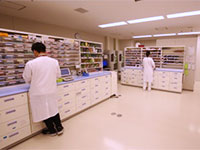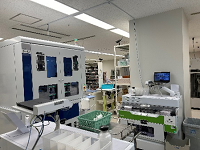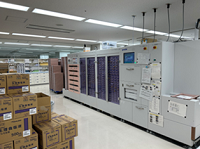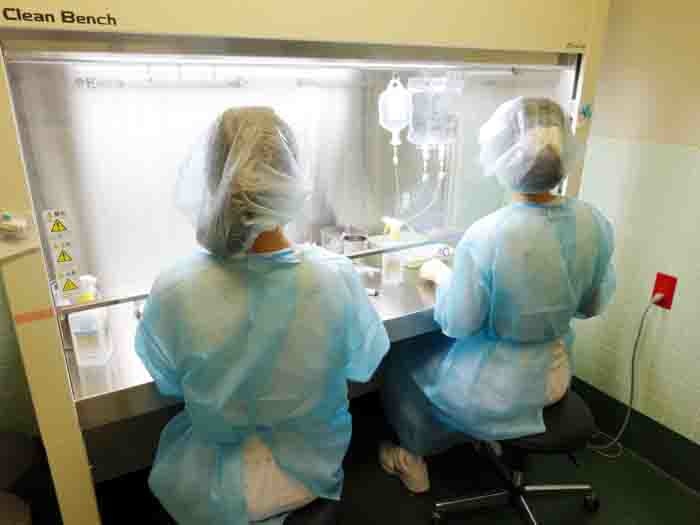Department of Pharmacy
Overview
Philosophy of the department
High levels of knowledge, skills, and a sense of ethics pertinent to drug therapy for cardiovascular diseases are applied to the provision of the optimum treatment and the advancement of medicine through research on therapeutic agents for the treatment of cardiovascular diseases and the dissemination of information.
Basic principles of the department
- We provide safe, reliable, high-quality, and highly specialized pharmacy services.
- We train pharmacists to play leading roles by providing information on recent advances in drug therapy for cardiovascular diseases.
- We promote clinical pharmacy research related to cardiovascular diseases.
- We disseminate information on drug therapy for cardiovascular diseases.
- We create an environment in which pharmacists can work with pride and a sense of accomplishment, and promote teamwork in health care.
Overview of the department
To provide high-quality, safe, reliable, and satisfactory health care to patients, pharmacists closely collaborate with physicians, nurses, and other healthcare staff to promote the proper use of drugs, ensure safety in medical care, and implement the appropriate drug therapy.
- Number of pharmacists: 46 (full-time, 38; part-time, 4;
pharmacy residents, 4); pharmacy assistant, 10 (as of December 1, 2023) - Number of pharmaceutical products handled: 1,156 (as of December 2023)
Generic products used at this center - Average number of prescriptions per day (oral, injection) (fiscal year 2021): inpatient, 941; outpatient, 33.
- Proportion of external prescriptions (fiscal year 2022), 93.3%.
- Number of patients receiving drug management and instruction services (fiscal year 2022): 1,433/month.
- Number of cases of drug management and instruction services (fiscal year 2022): 1,586/month.
- Number of drug blood concentration measurements (fiscal year 2022): 339/month.
- Number of drug blood concentration analysis cases (fiscal year 2022): 482/month.
- Number of cases referred for drug information (fiscal year 2022): 52/month.
 |  | |
| Dispensing room, tablets | Dispensing room, powder |
Features of the department
Because the hospital specializes in the treatment of cardiovascular diseases, a large number of cardiovascular drugs such as inotropic agents, antiarrhythmic agents, antithrombotic agents, and antihypertensive agents as well as immunosuppressants and antibiotics for heart transplant or the treatment of infection are commonly used. Many of these drugs have narrow effective ranges. For this reason, we measure drug concentration in the blood to ensure that the correct drug therapy is provided to each patient. We promptly analyze the measurement results, inform physicians of the analysis results, and determine the appropriate doses of drugs in cooperation with physicians.
We also provide information on drugs to patients for safe and efficient drug therapies and we work to ensure the prevention and early detection of adverse reactions. We regularly offer classes on hypertension, nephritis, renal failure, cardiac rehabilitation, and stroke, among others. Patients and family members are encouraged to attend these classes and learn about precautions regarding the daily use of drugs, and the effects and safety of drugs and how to use them. We explain these in an easy-to-understand manner to improve the patients' understanding of drug therapies.
 |  | |
| Dispensing room, injection | Clean room |
Certifications
- The training facility certified by the Japanese Society of Pharmaceutical Health Care and Sciences
- The training facility of Board certified Pharmacotherapy Specialist by the Japanese Society of Pharmaceutical Health Care and Sciences
- Facility accepting trainees for practical training from the Japan Pharmacists Education Center
- Pediatric drug therapy certified pharmacist system mandatory practical training acceptance facility
| Main staff and qualifications (as of July 2023) |
|---|
| • Certified pharmacist instructor (Japanese Society of Pharmaceutical Health Care and Sciences): 2 • Certified pharmacist (Japanese Society of Pharmaceutical Health Care and Sciences): 6 • Drug therapy guidance pharmacist (Japanese Society of Pharmaceutical Health Care and Sciences): 1 • Nutritional support team (NST) special therapist (Japanese Society for Parenteral & Enteral Nutrition): 2 • Board certified infection control pharmacy specialist (Japanese Society of Hospital Pharmacists): 4 • Board certified pharmacist in infection control (Japanese Society of Hospital Pharmacists): 2 • Infectious disease chemotherapy pharmacist (Japanese Society of Chemotherapy): 5 • Certified practical training pharmacist instructor (Japan Pharmacists Education Center): 8 • Certified Emergency Pharmacist (Japanese Society for Emergency Medicine): 1 • Sports pharmacist (Japan Anti-Doping Agency): 2 • Perioperative management team pharmacist (Japanese Society of Anesthesiologists): 1 • Chinese herbal medicine and crude drug certified pharmacist (Japan Pharmacist Training Center): 1 • Instructor who treats heart failure (The Japanese Circulation Society): 2 • Certified hospital pharmacist (Japan Society of Hospital Pharmacists): 1 • Outpatient cancer treatment certified pharmacist (Japanese Society of Clinical Oncology): 1 • Japanese Society of Clinical Pharmacology accredited CRC (Japanese Society of Clinical Pharmacology): 1 • NR/Supplement Advisor (Japan Clinical Nutrition Association): 1 • Medical information technician (Japan Medical Informatics Society): 1 • GCP Passport (Japan Society for Clinical Trials): 2 |
last updated : 2024/01/15
